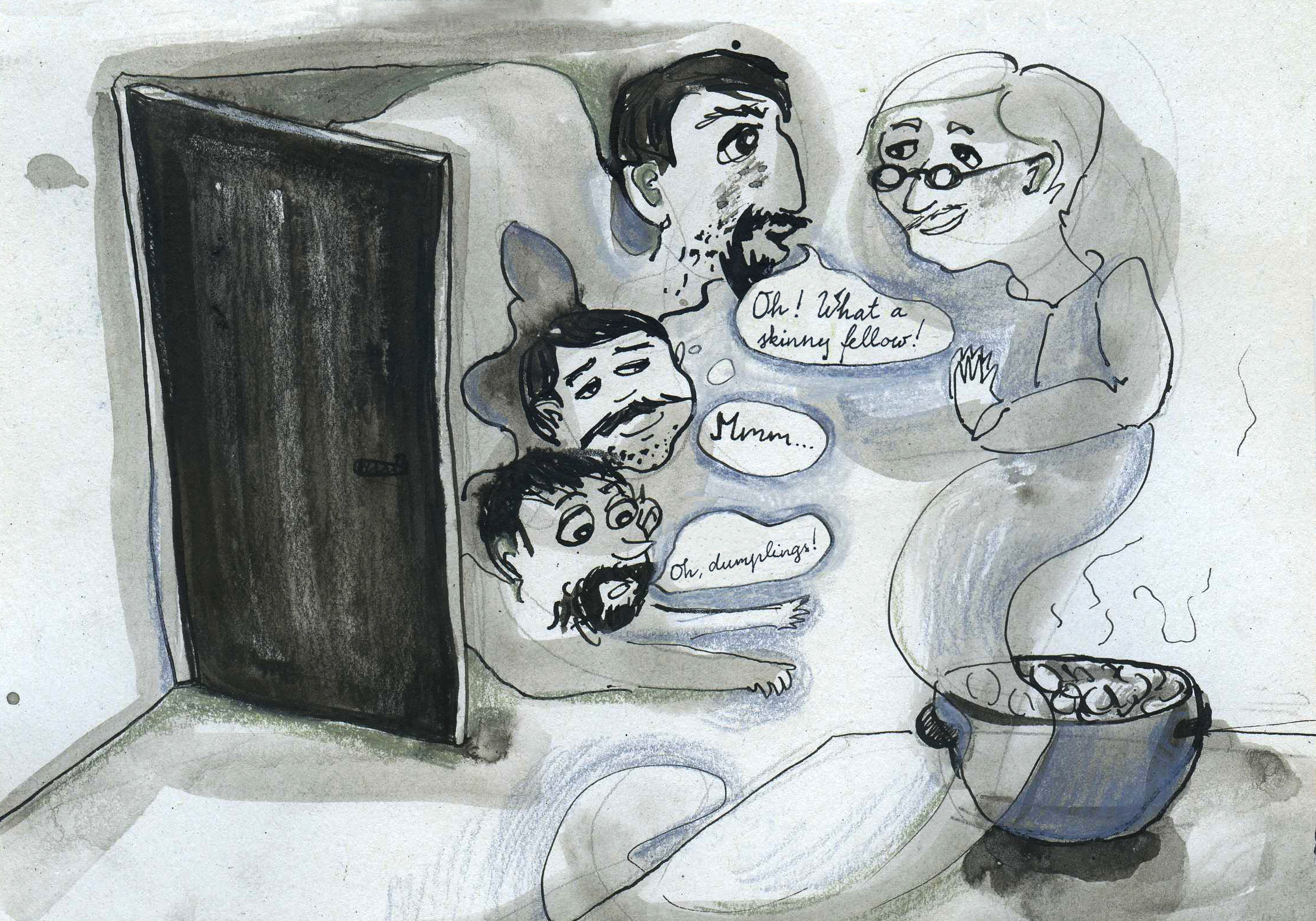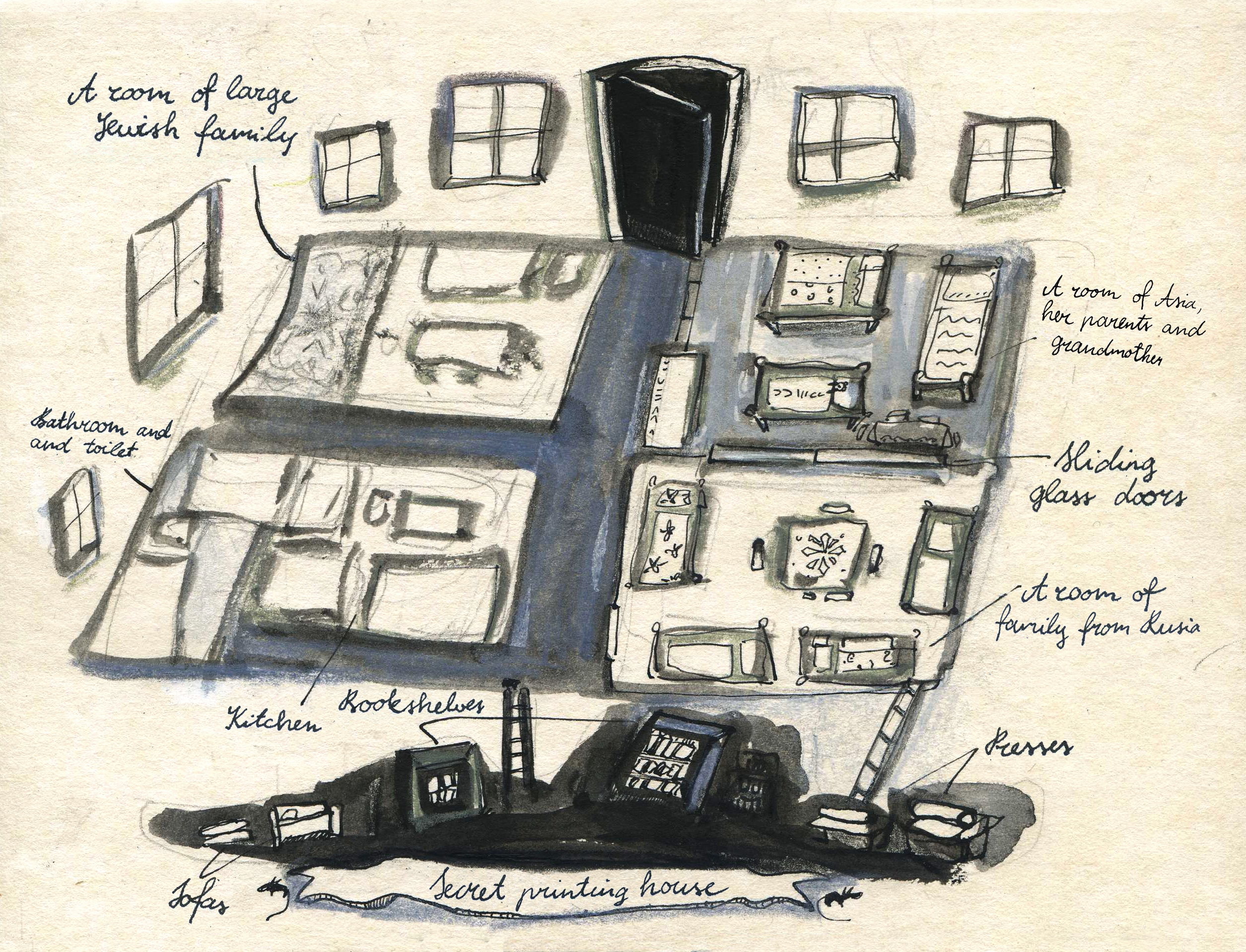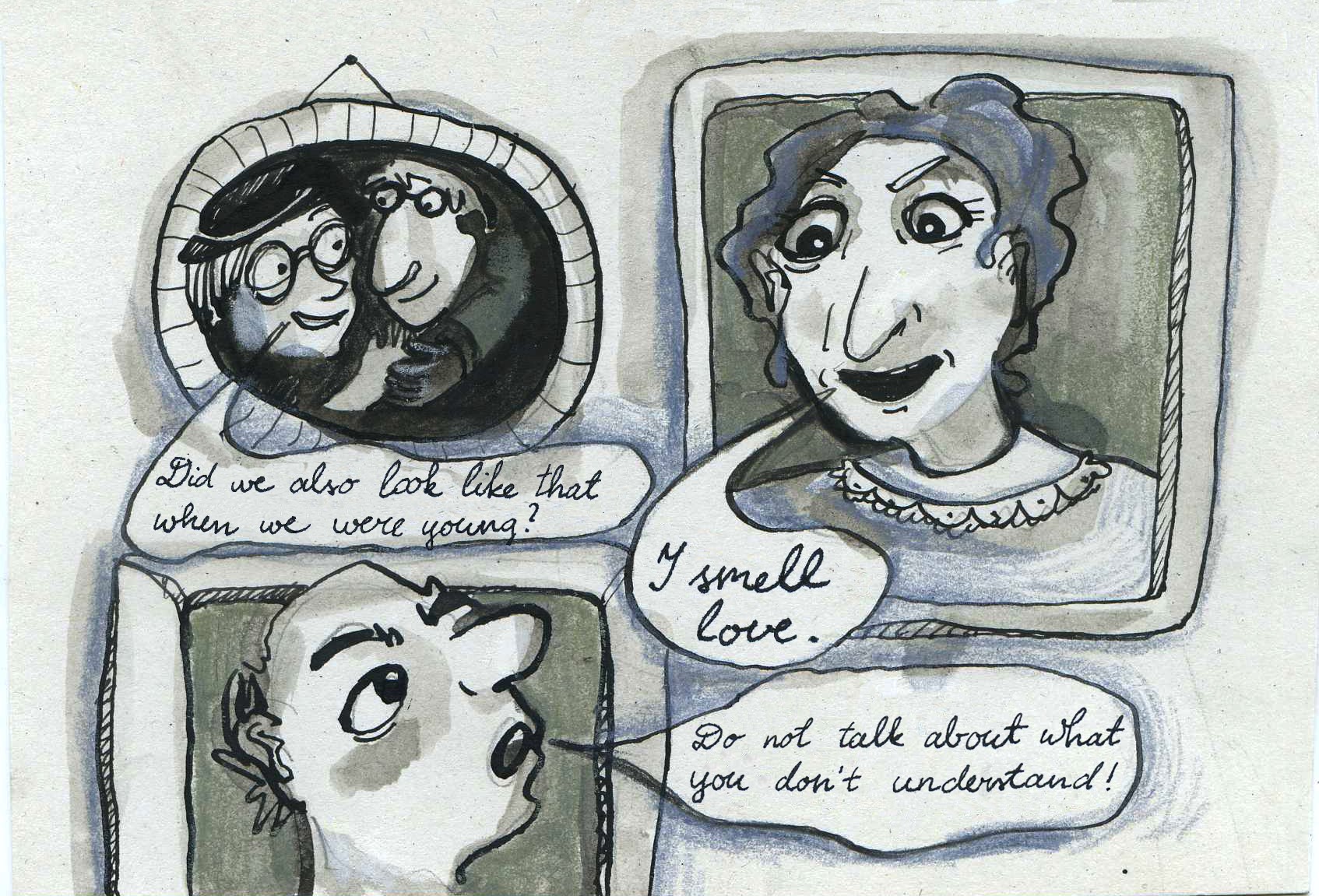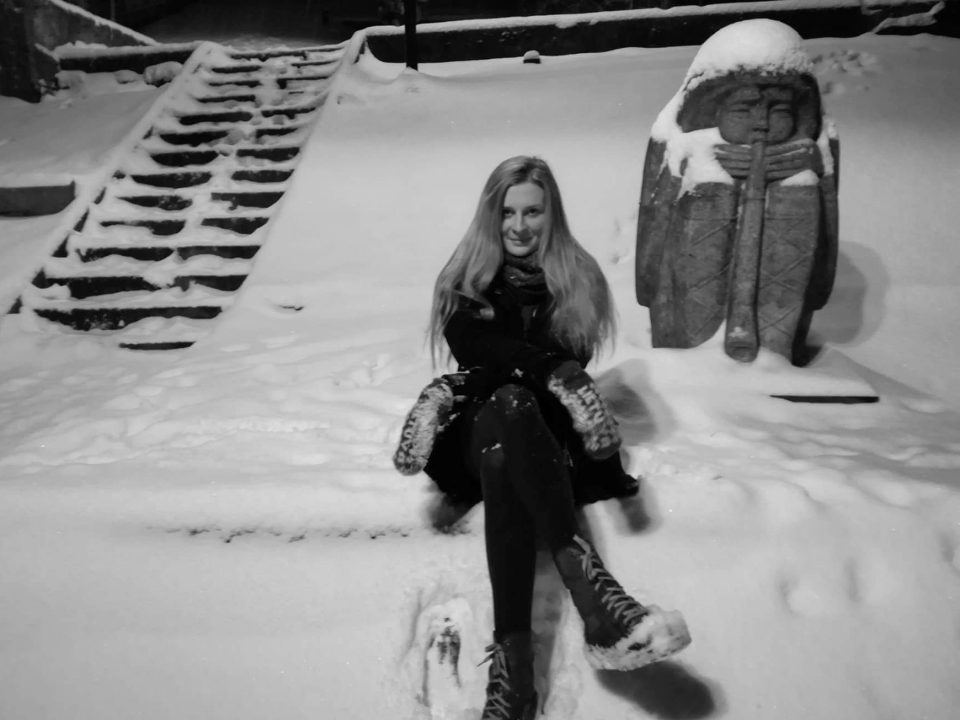Dalia BIELIŪNAITĖ

Rūta Vyžintaitė-Lajienė
2020-09-29
Daiva IVANAUSKAITĖ
2020-09-29



Illustration by D. Bieliūnaitė

Illustration by D. Bieliūnaitė

Illustration by D. Bieliūnaitė
Dalia BIELIŪNAITĖ
Assia, four ghosts, and a bunch of rats
Translated by Kristina Aurylaitė
A girl with long dark braids burst through the door. She was flustered, her dark eyes sparkled. It was Assia, the daughter of two young Crimean Tatars, who had settled in Kaunas after the war. She babbled excitedly, uttering words that her parents found hard to comprehend: “Mom, Dad, you know what happened today!? My classmates brought a load of bones to school! From the cemetery!”
Assia’s parents had a difficult time trying to figure out what had really happened. They barraged her with questions, but after a while suggested that she take a deep breath, get some rest, and eat some dumplings. She would explain it all to them again later.
The family had been living in this building since Assia was born, along with many other people of a similar fate; often, a family of four or even five would be cramming in a single room. Despite this density, everyone got along very well because they shared similar experience. Theirs were quiet and rather uneventful lives, their only problem being numerous rats, plaguing the building. That’s why Assia’s parents were so amazed to hear about human bones in their daughter’s school.
The aroma in the kitchen appeased the girl – as well as three unexpected guests, who had secretly accompanied her home. These were Khamir the Mighty, Timur the Wise, and Tuktar the Dim-Wit – three Tartar ghosts, whose entrance was immediately spotted and greeted by Stasys, the spirit of the deceased architect who had designed this building: “Oh! I salute you! Wherefrom have you arrived thither?”
Although Stasys frequently rambled inside the building, he had never noticed any other ghosts here before. Accustomed and indifferent to both humans and rats, whose earthly lives didn’t interest him one bit, Stasys now eagerly listened to the newcomers’ story. These three Tartar dead, it turns out, got awakened earlier today, when the works began to remove the cemetery from Ramybės park. Having woken up from their long sleep, the three Tartars remembered that each of them had one reason or another to linger in this world a while longer.
Khamir the Mighty wanted to talk to someone because he had spent his entire life in combat. Timur the Wise didn’t want anything in particular, but he had promised his wife that he wouldn’t inconvenience her at least after death. Thus, he had to stay here because she had crossed into the afterworld. Tuktar the Dim-Wit had been dreaming of eating his fill of home-made dumplings once again, but, alas, he hadn’t anticipated that after death he wouldn’t be able to taste food. When they saw a flustered dusky girl passing by the cemetery, the trio jumped to follow her without a second thought.
While the people were chatting and the ghosts were chatting, a policeman knocked on the door. He lived in the same building. The neighbours here were generally friendly, but order is order, and documents need to be checked on a regular basis. Because most of the residents of the building were migrants from foreign lands, everyone had to have their papers in order. While the policeman was checking Assia’s parents’ passports, a commotion broke out in the adjoining room.
A Russian family living behind a sliding glass door discovered their grandma’s passport was missing. The silhouettes of the numerous family members could be seen running back and forth behind the glass door, frantically searching for the passport. The search wasn’t successful as the document had been missing for quite a few days already, and most of the family assumed that it had been destroyed by the rats.
However, the rats could hardly be blamed for this. They had been involved, no doubt about it, but only because they had wanted to help this family as these people used to leave them so many delicious crumbs. Three days before, the rats had seen a stranger, a woman clad in a red dressing gown, pocketing the Russian grandma’s passport. They instantly realized that they needed to take action or their beloved humans would get into trouble.
Under the floor of that apartment, between the wooden joists separating the floors, the rats had established a tiny publishing house, operating with a few tiny printing presses. Nothing serious, mostly self-publications; however, little by little, something like a real cultural life started developing there, and the printed word occupied an important part in it. That particular publishing house was also used to secretly print a new document for the Russian grandmother. Fifteen more minutes, and the passport would have been ready, but there was another knock on the door.
Due to the commotion, it took the family some time to let in a woman, clad in a red dressing gown. It was that same passport thief.
“Good evening,” she said in Russian, “I’ve brought the poison.”
“Oh yes, yes, come in, we are very busy, but don’t pay us any attention and get to work. Those stupid rats have already started nibbling on the documents!”
And thus, without further ado, the unexpected guest began her dirty work – exterminating the rodents.
When the poisonous powder started falling through the gaps between the planks of the wooden floor, the policeman, who had already checked Assia’s parents’ documents, stepped into the room behind the sliding glass door. He set his austere eyes on the Russians and told them to show their documents.
In the meantime, the rats were frantically rushing about, trying to get away from the poison, falling on them through the floor. The grandma’s papers were forgotten. The policeman, having looked at the documents handed to him and having found one passport missing, was not ready to relent: “We’ll have you evicted. Only documented residents allowed in this building!”
The grandma started sobbing mournfully. Assia, who was watching the scene from another room, burst into tears as well. Her parents tried to calm her down, but did not dare to interfere. No tears or entreaties from friendly neighbours would have helped in this case, because order is order, and documents have to be in order, too.
Then suddenly, there was a shriek. It came from the woman in a red dressing gown. Everyone’s eyes darted in her direction, but things were developing so quickly that only the four ghosts did notice what happened.
No human eye could see how a brave young rat sprang and bit the poisoner woman’s finger and, pushing itself against her body, leapt straight into a wide pocket of her red dressing gown. In there, it found the Russian grandma’s real passport, flung the tiny book onto the floor, and rapidly vanished in a hole, gaping in the wooden floor.
The poisoner’s eyes glowed viciously, and a series of swearwords emanated from her mouth while everyone’s eyes were glued on the old passport lying on the floor. The grandma was saved. The policeman picked up the passport and examined every single page. Then he muttered something about everything being fine and departed as quickly as he could; he always found the process of checking the documents tedious and tiring.
Using the moment while the poisoner woman wasn’t busy doing her dirty work, the rats managed to escape; they even took some of the printing presses with them. In the meantime, the unsuspecting Russian family rushed to take care of the infuriated poisoner. They bandaged her finger, collected the packages containing poison, which lay scattered all over the floor, and tried to coax her into coming back to finish her job tomorrow afternoon: “They will be showing a movie about the October Revolution near Soboras, and almost everyone will have gone to watch it, so it will be quiet over here. No one will disturb you.”
***
The next day, the apartment, usually crowded, was indeed almost empty. The four ghosts, who remained inside, were quietly examining a large portrait of Vytautas the Great and numerous photos in delicate wooden frames on the walls. Children must have found the movie boring, because Assia was the first to return home. She was holding hands with a young blond lad. Stasys the architect was very surprised at the sight as it was unusual to see a Lithuanian boy befriending a Tartar girl. Foreign children did not know much Lithuanian, so they would usually hang out together.
This young Lithuanian lad knew Russian very well. The photos of Assia’s relatives were overjoyed to hear him speak Russian: “We salute you, Lithuanian child,” said an elderly woman in a photo, hoping he would hear her, but only the ghosts could hear the photograph speak.
The ghosts were intrigued by the old woman. The three Tartars asked her to tell them how Assia’s family had found themselves in Lithuania because not even Stasys, who had spent so much time with them, knew much about this.
“Ten years ago, the girl’s parents-to-be returned to their native Ukraine. Both were exhausted as they had been working and fighting for the country that was not their own. Assia’s father was afraid he would have no peace in his homeland, as it wasn’t free, and so he decided to leave again. His friends suggested that he travel to Lithuania because over there his compatriots could easily mingle with other Russian speakers, most of them coming from Russia, and would not attract too much attention.
“But how does one move to a foreign country all alone? Once again, suggested by his friends, Assia’s father-to-be set out to look for a wife. Assia’s mother had just returned from Germany, where she had been transported against her will to work. Tired and sad, she was also looking for a way to live a safe and peaceful life together with Assia’s grandmother. These two young unfortunates were brought together by their friends.”
At this point, Timur the Wise, who was getting visibly agitated, interrupted the old woman: “We were there, too. All three of us.”
Everyone stared at him. Timur the Wise proceeded to continue with the old woman’s story: “Ten years ago, we were awakened, just like yesterday. But at that time, we decided to visit our native Ukraine. There we met the girl’s parents-to-be. We saw how their friends kept trying to get them acquainted, but – the strangest thing! – that ugly witch was there, too, the same one who arrived to poison the rats yesterday. She kept interfering with the young people’s plans, hindering them constantly.”
“That ugly witch stole Assia’s parents’ documents!” declared Tuktar the Dim-Wit, infuriated.
“However much we tried, we couldn’t help them, because we were dead. It was the rats that helped them escape to Lithuania. At the last minute, they managed to print new passports for them in their own tiny publishing house. Then it was a tiny venture, operating with only one printing press; the rats published amateur manuscripts and would occasionally help out people who wanted to leave by forging them new passports,” explained Timur the Wise.
“Who is she, that woman in a red dressing gown, who steals passports? And why does she keep trying to harm these people?” wondered Stasys the architect.
“I would want to find that out, too,” declared the hero of yesterday, whose sudden appearance startled Assia. Terrified, she jumped off her chair, stepping onto her friend’s foot. The Lithuanian lad tried to calm her down, assuring her that such a tiny rat would do her no harm, but his efforts were futile.
You must have already gathered that this story, which took place in the house #3 on Laisvės avenue in 1959, does not end here. Did Assia befriend the brave rat? How are the three Tartars doing today? Are they still sleeping, or do they wake up for the CityTelling Festival to narrate their stories? You can create your own ending or maybe you will want wo ask someone who is good at storytelling?
The narrative was inspired by the Crimean Tartar Asija Kovtun’s story, recorded by the Memory Office, a program by Kaunas 2022. You can find this story here.
These three Tartar dead, it turns out, got awakened earlier today, when the works began to remove the cemetery from Ramybės park.


